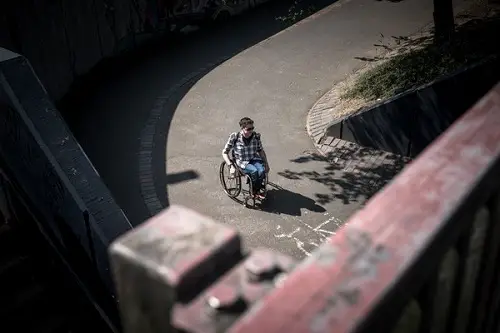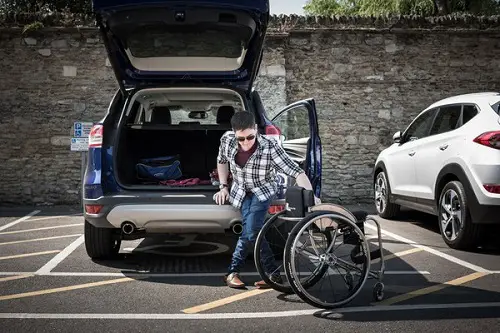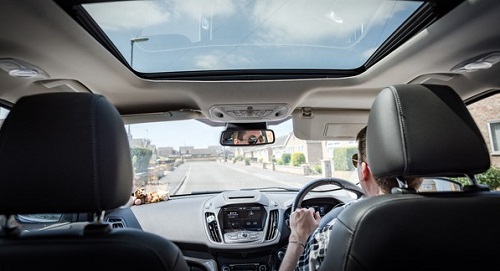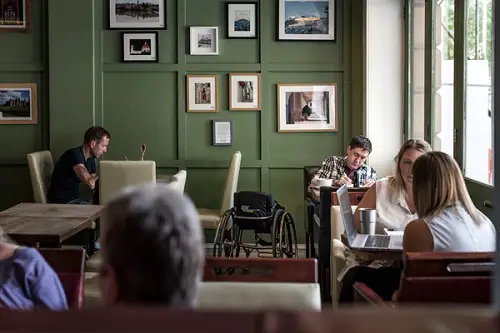
David Proud: disability is never an individual diagnosis
Actor David Proud, who was born with spina bifida, has appeared in a number of BBC TV series, such as EastEnders, Desperados and Siblings, as well as four films, including ‘Special People’ (2007) and ‘iWitness’ (2014). Here he shares his blog post on fears and hopes around growing older if you have a disability.
As a 35-year-old man, I am sure that my fear of getting old is not uncommon. But for me, because I have spina bifida, that fear goes deeper.
I have no problem with finding the odd grey hair or having an excuse to be a little grumpier. What worries me is that I use a wheelchair and, while my condition allows me to function reasonably well at the moment, I might one day become more limited.
As someone who played wheelchair basketball for more than 20 years, I am pretty handy in a wheelchair. But I worry that my mobility will become increasingly impaired. At the moment I get by. But I am noticing changes. Things are starting to take their toll – longer distances in my wheelchair, steep inclines and rough pavements.

The greatest impact is on my energy. Even basic, day-to-day movement, requires a tremendous amount of stamina. I liken it a non-disabled person trying to walk through treacle. I am pushing my entire weight, and the weight of my wheelchair, through each and every movement. And this makes me selective in the activities I decide are worth that effort.
Family matters
As a married man and a father, I know that my family have to assist me more than someone without a disability. For my wife, there are tasks that are never ‘my turn’. It is always her who puts out the bins, lifts heavy objects and builds the flat-pack furniture.
I know that I bring other strengths to my family. But there is no avoiding that a disability is never an individual diagnosis – it is always a family that deals with a disability. So, it’s not just my own ageing that I have to consider; as my wife grows older her responsibilities will inevitably become more challenging too.

A brighter future for disabled people
However, it isn’t all doom and gloom. I am immensely proud of my disability. It has made me ambitious and driven. It is both my superpower and my kryptonite. My delight in proving doctors wrong for the past 35 years has helped me to keep going. In fact, proving them wrong has become a hobby of mine. Recent advances in medicine and technology have also allowed me a glimpse of a brighter future.
My first wheelchair from the NHS was horrendous. I got it home, took the side guards off and my dad removed the anti-tip bars at the back. It was like a montage from The A-Team. I got into playing basketball and discovered titanium wheelchairs. They’re commonplace, now but were cutting edge back then. Technology has evolved and the innovation generation has hit wheelchair mobility and design in a massive way.
Now, I can get a wheelchair that allows me to go over grass, so I can attend music festivals, or even trek to Machu Picchu. I can get a chair that will elevate me up to the top shelves in a shop or library, and I can now go to a beach with my son.

These moments are priceless. But, unfortunately, the chairs are not. A Segway wheelchair costs in excess of £8,000. A simple electric wheel to aid manual wheelchair users will set you back almost £5,000. The fear kicks in again that access to this technology is not based on need, but on the size of one’s bank balance. This makes disability not just an impairment, but also a potential poverty marker.
Medical advancements
Leaps in technology are great, but advances in medical science could make them all redundant. In the future, it may be possible to cure all impairments. With an increased ability to scan for abnormalities at birth, and an increase in our understanding of various disabilities, the idea that someone could cure me has never been more real.
I struggle to process my feelings about this. I attribute so many positive things in my life to my disability, so how would I feel about my identity changing to such a major extent? While I suspect that it is still not something that will happen in my lifetime, we can at least begin to think and talk about it more.

Growing old and staying young
For now, I will try, within my means, to use technology to help me and my family, and to push the boundaries of my activities to stay as fit as I can. I will try not to laugh when my smartwatch tells me that I’ve done 1,000 steps in a day and gone up a flight of stairs. I will try and grow old like everyone else, and push all other worries to the back of my mind.
Age forces all of us to make compromises, and once you begin to peel back the layers of mobility and independence, you find that everyone is just trying to stay as active as they can for as long as they can. We are all battling an impairment of some sort, and will all end up in the same place at the end.
In my mind, it’s not a question of how we grow old, but how we stay young. If medical and technological advances can assist, then great. But neither of them will ever match the benefits of good old-fashioned positive mental attitude and a good sense of humour.
By David Proud
This article was originally posted on Wellcome Collection blog.
More on Disability Horizons…
Well said buddy and great introspections! As I continue with my injury, I see things, impacts, repercussions that have been there but I just had never seen. Your lens shines light to lots of my similar thoughts to help facilitate others on their journey. Thanks for sharing.